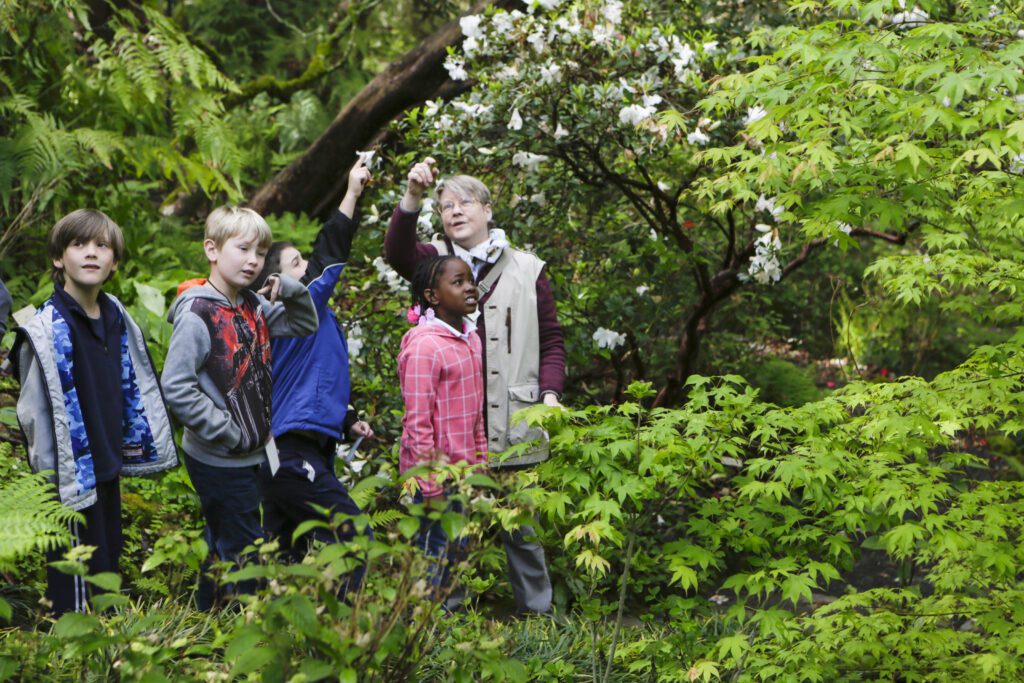
K-12 Youth Tours
Tours provide a fun, educational activity for students, school field trips, summer day camps, and youth groups.
On your tour, your group will be divided up into small groups with a volunteer docent leader for each group. Youth tours are aligned with California State Next Generation Science Standards and are designed to supplement in-class learning.
Tour Fees
All tour fees listed are per person and include Garden admission. There is a $100 minimum to schedule a group tour.
If cost is a barrier for your group, please contact gardentours@berkeley.edu. We do consider requests for free or reduced-rate admission on a case-by case basis.
-
Youth (4–17)
$8 -
Chaperones and Teachers for Youth Groups
Free
Book Your Tour
Please complete this K-12 youth tour form to request a tour. You must submit a request by the 15th of the month prior to your desired tour date. For example, if you would like a tour in May, you must submit a request by April 15th. Unfortunately, we cannot accommodate requests with a shorter lead time.
- Groups may enjoy a 30 minute picnic lunch in the Garden with prior approval.
- If you would like to stay after lunch, you must submit a structured, supervised activity for students to complete for prior approval.
- Tours are given rain or shine. Come prepared for the weather.
If cost is a barrier for your group, please contact gardentours@berkeley.edu. We do consider requests for free or reduced-rate admission on a case-by case basis.
Accessibility Information
The Garden is located in a canyon with a variety of elevations and terrain, including paved paths and unpaved gravel paths.
For questions about accessibility or special accommodation needs for your group please email: gardentours@berkeley.edu.
Chaperone Information
Due to the value of our research collection, youth tours require sufficient adult chaperones to ensure students are supervised by an adult at all times. Adult chaperones are provided free admission for docent-led tours. We require the following ratios for the number of adult chaperones to students. Ideally, groups will also have one “floater” adult or teacher in addition to the minimum ratio:
(1) Adult per (4) Pre-K students
(1) Adult per (5) K-3rd Grade students
(1) Adult per (6) 4th-8th Grade students
(1) Adult per (8) High School students
Types of Tours
Youth Tour Offerings:
PRE-K – 1st GRADE: Plant Wonders: A Sensory Walk
45 MINUTES
Use all five senses to experience nature in the Garden. Touch, look, listen, smell, and taste as you investigate plants from around the world. Learn about roots, stems, leaves, flowers, fruits, seeds, and the life cycles of plants.
*For Pre-K Tours, all children must be at least 4 years of age at the time of the tour.
ALL GRADES: Discovering Plants
60 MINUTES
Develop your powers of observation as you explore plant communities from around the world. Why are there so many kinds of plants? How do their differences help them survive in their diverse environments? Discover the purpose of a flower – what the flower attracts, how, and why.
You may also select an optional sub-focus for your group from the options below.
Discovering Plants Sub-Focuses
All Grades
Pollination: The bees, butterflies, and hummingbirds you can observe in the Garden are just some of the world’s 200,000 species of pollinators. Discover how insects, birds, bats, and wind are essential in the life cycles of many plants and crops. This sub-focus is best in Spring & Summer.
Plant Travelers: Seeds, Spores, Runners: Can plants really travel? Marvel at botanical fruit and seed adaptations, such as slingshots, parachutes, hitchhikers, helicopters and other mechanisms, that propel plant seeds around the Garden. This sub-focus is best in Fall.
All Grades
Trees in the Garden: How are trees different from other plants? How do they adapt to their environments, make food from sunlight, grow, and reproduce? In what ways are they essential to life on our planet? Visit trees from around the world, including the kinds of trees that lived when dinosaurs roamed the earth, and examples of the world’s tallest and most massive trees.
Grades 3 and Up
Plant Evolution: Learn how plants have adapted over millions of years to a changing earth and climate, and have made it possible for other species to evolve.
California Plant Communities: Explore plant communities including alpine fell-field, chaparral, coastal dune, desert, pine-oak woodland, pygmy forest, redwood forest, serpentine, and vernal pool. Compare the characteristics that allow plants to thrive in the Golden State’s unique ecosystems.
We can tailor tours to fit the needs, interests, and age or grade level of your group. Some other topics that we have explored in the past include patterns in nature, ethnobotanical uses of plants, and climate change.
